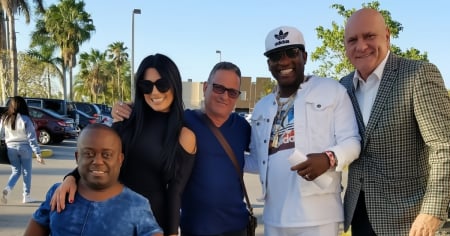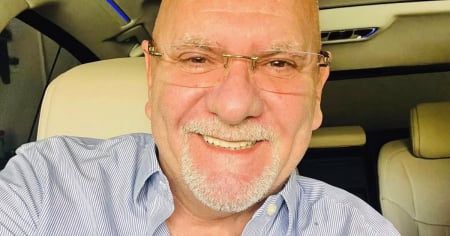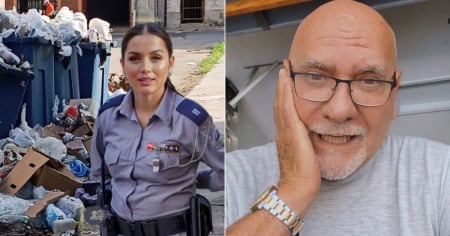The presenter, Carlos Otero, has raised his voice against the prolonged delays in the family reunification processes for Cubans in the United States.
Through his social media program, "La Hora de Carlos", he presented his personal case, which is that of thousands of compatriots who have been waiting for years to reunite with their loved ones.
Eight years of waiting for her son's visa
Otero revealed that his eldest son, Carlos Manuel Otero Franco, 37 years old, has been waiting for the approval of his visa to legally travel to the United States for the past eight years.
The presenter, who emigrated in 2007, expressed his frustration at the inaction of the authorities.
According to what he explained, when he obtained U.S. citizenship, he was assured that the process of claiming his son would only take four months. However, almost eight years have passed without resolution.
"I want to take this part of the show to send a message to the Department of State of this great nation. I want to send a message to our congressmen, Carlos Giménez, María Elvira Salazar… to Mr. Marco Rubio," Otero began saying on his program.
"I am going to speak on behalf of all Cubans who have been processing family reunification with our loved ones for many years," he added.
Otero clarified that he does not criticize those who enter the U.S. through other means to improve their quality of life, but urged lawmakers to review the cases of family reunification.
The presenter explained that his son's case was already approved by USCIS in September 2023, but the process has stalled at the Department of State.
"How is it possible that my son's visa has been authorized by USCIS since September 2023, and that visa has been at the State Department for almost two years?", he complained.
According to the details provided, the only thing left is for the visa to be sent to Havana so that his son can attend the consular interview and finally travel to the U.S. to reunite with him and his siblings after 18 years.
Otero acknowledged that the humanitarian parole program and other migration processes have caused "disruptions," but insisted on the urgency of prioritizing family reunification cases.
"Our congress members must review... The visa of all the people we've been trying to reunite with our families for a long time has to be in some office," he emphasized.
The 63-year-old host also urged the Cuban community in the U.S. to pressure their political representatives to prioritize these cases.
"If you know any congressperson, send them this message," he asked his audience.
"If someone achieves it before me, congratulations. If I achieve it first, congratulations to me as well. But we need to be heard," he concluded.
In the comments section of his YouTube channel, Otero received gratitude from many people facing similar situations.
And their case is not unique: many Cubans have reported waiting periods of between 10 and 15 years to complete their family reunification processes, while others have managed to enter the U.S. in a shorter time through parole and other immigration pathways.
What is the Cuban Family Reunification Program?
The Cuban Family Reunification Program (CFRP) is an initiative by the U.S. government that allows certain U.S. citizens and permanent residents to apply for Advance Parole for their relatives in Cuba.
This program enables beneficiaries to enter U.S. territory before their immigrant visas are available, providing a safe and orderly pathway for family reunification.
The CFRP was established in 2007 with the aim of providing a legal and structured alternative for the immigration of Cuban relatives, thus avoiding dangerous and irregular routes.
However, in recent days, the Donald Trump administration ordered an "administrative pause" in the immigration processes of thousands of beneficiaries of programs such as humanitarian parole and family reunification.
Frequently Asked Questions about the Family Reunification of Cubans in the United States
Why does Carlos Otero criticize the delay in the family reunification of Cubans in the United States?
Carlos Otero criticizes the delay in family reunification because his eldest son has been waiting for eight years for his visa approval to travel to the United States. Otero believes that authorities should prioritize these cases to avoid the long wait faced by many Cuban families.
What is the current status of the Cuban Family Reunification Program (CFRP)?
The Cuban Family Reunification Program (CFRP) is facing significant delays due to the suspension and review of immigration processes under the administration of Donald Trump. This has left many beneficiaries in a state of uncertainty regarding their ability to reunite with family members in the United States.
What actions has the United States government taken regarding family reunification programs?
The administration of Donald Trump has temporarily suspended family reunification processes to review concerns about fraud and security. This decision has created uncertainty and worry among Cubans hoping to reunite with their families in the United States.
How does the suspension of immigration procedures affect Cubans?
The suspension of immigration processes affects thousands of Cubans by delaying their ability to regularize their immigration status in the United States. This has created a legal limbo for immigrants, who face long waits and the uncertainty of not being able to reunite with their loved ones.
Filed under:





